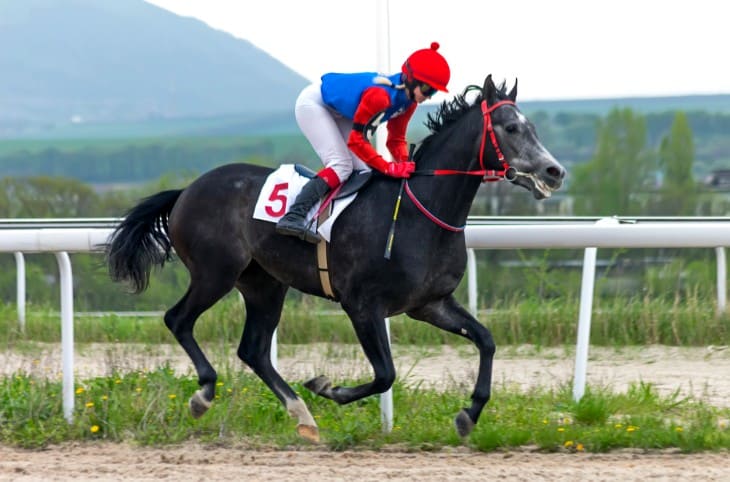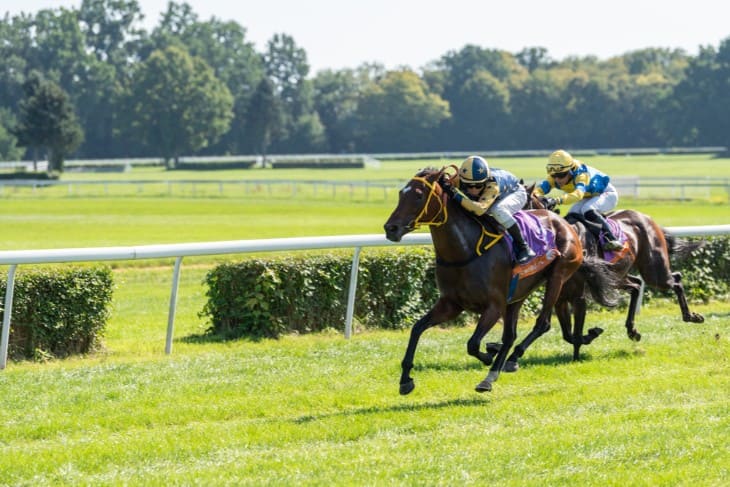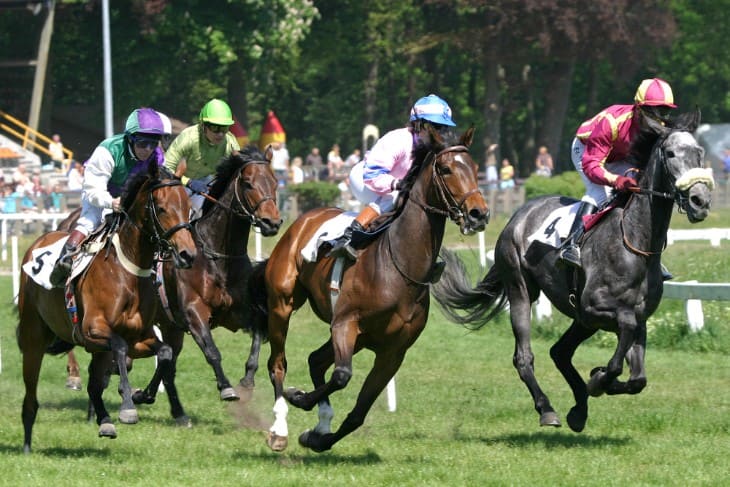- The Allurement for Treble Betting in Horse Racing
- How does this type of bet work?
- Choosing Horses for Treble Bets: The Strategy
- Comparing Treble Bets and Other Horse Racing Wagers
- The Role of Research in Successful Treble Betting
- Calculating Potential Returns from a Treble Bet
- Managing Risk in Treble Betting
- In Summary
A treble bet in horse racing is a type of multiple bet where three horses are selected by bettors in three races. Now for the bets to pay off all the horses must win the races. It's a higher-risk, higher-reward strategy compared to single or each-way betting. It is very popular among bettors who crave amazing results and big cashbacks with just a small amount at stake.
The Allurement for Treble Betting in Horse Racing
Treble betting horse racing is quite appealing to many gamblers. The main attraction is the possibility of huge returns from little investments. A treble bet combines the odds of three separate races and this can result in significant payouts that cannot be achieved by making single bets.
One of the things that makes treble betting interesting is its complexity. You are supposed to select winning horses in three different races, which requires expertise in horse racing. For people who follow this sport closely, it is another way to add fun to it. It's not just about picking the best horse; you need to know how each race works to make informed choices.
Another thing that makes treble betting attractive is its intelligence aspect as opposed to the pure luck of other gambling activities like casino games and lotteries. One has to research various aspects such as horses, track conditions, and their past performances. This study forms an important part of choosing successful favourites. For aficionados, delving deeper into this kind of details related to the game brings satisfaction and delight at the same time.
Trebling your outlay may lead to enormous profits but it also carries risks with it. Your chosen three horses have got to win all their respective races something which might prove more difficult than you actually think or anticipate. This risk element adds a thrill for many individuals making every race into an edge-of-the-seat encounter more than a typical or standard one-race bet.
The attractiveness involved in trebles on course lies in; the potential rewards; knowledge and skills it demands; and excitement because of its challenge since through strategy combined with chance done by form reading we can assess if there are any future champions amongst these runners. It is a type of betting that pays off for those who take the time to dissect the contests and come up with rational decisions based on facts from statistics books. Many punters in this race prefer to have trebles since there is an element of strategy, risk and potential rewards making it a fascinating part of the sport.
How does this type of bet work?
Treble betting horse racing is a simple but thrilling way of gambling. Put simply, you are choosing three different horses from three races to win a treble bet. The catch here is that all the three horses chosen must win their respective races for your stake to pay off.
This is how it works practically. First, pick your three horses separately for three different races either on the same day or after a few days. After settling on your choices, you make your bet. The amount you gamble with depends on you but remember it is the same stake in all three races.
The exciting thing about a treble like any other multiple bet or parlay as it's called in some countries is that it uses previous winnings to determine subsequent amounts awarded at every possible outcome. This means if your first horse wins, then whatever you won will be used as a stake for the second one. If this second one also comes out victorious, then his/her winnings will be placed on the third horse and so forth thus having an increasing payout possibility with each race won
However, it is essential to remember that if any of the three horses fail to win, then the bet is lost. This is what makes treble bets both challenging and thrilling. You are not just betting on one race but on three. For each succeeding race, the stakes increase, which makes every race more captivating.
Calculating possible winnings from a treble is simple too. You multiply the odds of each winning horse together. Therefore higher odds can lead to a larger payment in case of winning. But at the same time, this implies that such a bet is riskier.
To get a return in a treble bet, you must pick winners in three different horse races. This means that all three have to win for your ticket to be successful. From one stake to another, the winnings are compounded to reach high payouts. Horse racing becomes more fascinating when there's a form of betting which raises its level of excitement and challenge.

Choosing Horses for Treble Bets: The Strategy
- Research Each Horse's Form and History: Starting with analysing every horse's form would assist in picking horses likely to win for treble bets. Particularly examine former race outcomes especially recently held ones so you know how well they currently are doing. Also, check out any previous experience of this particular course or any similar racing conditions. Some horses run better on certain tracks or weather conditions.
- Understand the Track Conditions: A horse's performance will significantly depend upon track conditions set by management; some prefer dry tracks while others flourish when running under wet climates. Before placing your bets consider checking up on what weather has been projected as well as how the tracks' condition appears. The right choice depends on how each horse performs under specific conditions.
- Evaluate the Competition: Go through other horses in each race. However strong competition may affect even a likely winner. If anyone wishes to place bets accurately they need to understand the weaknesses and strengths behind racers. It's about knowing what kind of horse each one is.
- Consider the Odds: While odds shouldn't be the only factor, they do offer insight into a horse's chances. For instance, short odds mean the chance of victory is high but winnings will be small. This is what bookmakers think of his/her probabilities. A horse with long odds can bring in a much bigger payout, but it is also much riskier.
Comparing Treble Bets and Other Horse Racing Wagers
- Single Bets: Single bets are the simplest form of betting in horse racing. You choose one horse to win one race. If this does happen you receive some payment determined by the quantity bet and odds Otherwise known as Win, single wagers are less risky than treble bets because you depend only on one choice during the entire tournament.
- Each-Way Bets: Each-way bets are a combination of win bets and place bets. The punter backs his/her favourite to either win or finish in top numbers depending on how many positions are being paid under given conditions. It's worth noting that there exist more chances to win as compared with trebles because even if your horse doesn't finish first still it may give you some return.
- Accumulator Bets: Also termed multiple bets, however, they involve four or more selections. For the bet to pay out, all selections must win. More races being involved means that accumulators offer potentially higher returns than treble bets. Nevertheless, there is also an increased risk of losing money. The more races you bet on, the harder it becomes to pick all winners.
- Double Bets: In addition to this, double bets usually include two selections in two different races. For the bet to pay out both must be won by individuals selected and placed as candidates of a particular race. In terms of complexity and potential payout, Double bets are below treble ones although not by much. This can be seen as a balancing act between single bets with simplicity and higher risks associated with treble bets.
The Role of Research in Successful Treble Betting
Research plays a crucial role in successful treble betting in horse racing. To increase your chances of winning, you need to gather as much information as possible about the horses, the races, and the conditions.
First, focus on the form of each horse. This involves looking at their recent performances in races. Check how they've done in their last few outings. A horse in good form is more likely to continue performing well. Also, consider the distance of the races. Some horses do better over longer distances, while others excel in shorter races.
Next, look at the track conditions. These can have a big impact on a race. Some horses perform better on dry, fast tracks, while others prefer wet, slower conditions. The weather on the day of the race can also be a deciding factor. Keep an eye on the weather forecast and choose horses that suit the conditions.
It's also important to consider the jockeys and trainers. Experienced and successful jockeys and trainers can make a big difference. Look at their track records in similar races. A good combination of horse, jockey, and trainer can significantly boost your chances of winning.
Another aspect of your research should be the competition. Look at the other horses in each race. Even a strong horse can struggle against particularly tough competitors. Assess the strengths and weaknesses of each horse's opponents.
Finally, consider the odds. While they shouldn't be the only factor in your decision, they do indicate a horse's chances according to bookmakers. However, remember that longer odds mean higher potential returns but also higher risk.

Calculating Potential Returns from a Treble Bet
- Understand the Odds: To calculate the potential returns from a treble bet, start by understanding the odds of each horse you've chosen. Odds are usually presented in fractional forms, like 3/1, 4/1, or 5/2. These odds tell you the potential profit relative to your stake. For example, if you bet on a horse at 4/1 odds, and it wins, you'll get £4 in profit for every £1 you staked. Understanding these odds is crucial for calculating your potential returns from a treble bet.
- Multiply the Odds of Each Selection: In a treble bet, the odds of each of your three selections are multiplied together to calculate your total potential return. This is what makes treble bets potentially very lucrative – as each horse wins, the winnings roll over to the next bet. For instance, if your three selections have odds of 3/1, 4/1, and 5/1, the combined odds are calculated by multiplying these together: 3/1 x 4/1 x 5/1. This gives a combined odd of 60/1.
- Calculate the Total Potential Payout: Once you have the combined odds, you can calculate your total potential payout by multiplying these odds by your stake. Continuing with our example, if you placed a £10 bet on a treble with combined odds of 60/1, your total potential return would be 60 x £10, which equals £600. This includes your profit and the return of your original stake.
Managing Risk in Treble Betting
- Bet Only What You Can Afford to Lose: The first rule in managing risk with treble betting is to bet only what you can afford to lose. Treble bets are riskier than single bets because all three selections must win. Therefore, it's crucial to bet responsible. Responsible betting means setting a budget and sticking to it.
- Do Thorough Research: Research is key to making informed decisions in treble betting. The more you know about the horses, track conditions, and other relevant factors, the better your chances of winning. Spend time studying the form of each horse, the race conditions, and the competition. While there's no guarantee of winning, thorough research can significantly improve your odds. It allows you to make educated guesses rather than just relying on luck.
- Diversify Your Bets: Don't put all your eggs in one basket. Instead of only placing treble bets, consider diversifying your betting strategy. Mix in some single or each-way bets. This can help balance the higher risk of treble bets. Diversifying your bets means spreading your risk. If your treble bet doesn't pay off, you might still win on your other bets. This approach can help mitigate losses and keep your betting experience positive.
- Understand the Odds: Being clear about the odds of each selection helps manage risk. Remember, longer odds mean higher potential returns but also higher risk. Choose your horses wisely based on their odds and your research. Balancing the potential return against the risk is crucial. You might be tempted by the high payout of long odds, but remember, the chances of winning are lower. Conversely, shorter odds offer smaller payouts but a higher chance of winning.
In Summary
Treble betting in horse racing offers the excitement of potentially significant returns from a small stake. However, it requires skill, knowledge, and a thorough understanding of the sport. For those willing to do their homework and take calculated risks, treble bets can be a rewarding aspect of horse racing betting.
Whether you're a seasoned punter or new to the sport, understanding the dynamics of a treble bet is essential for anyone looking to add an extra level of excitement to their horse racing experience.








